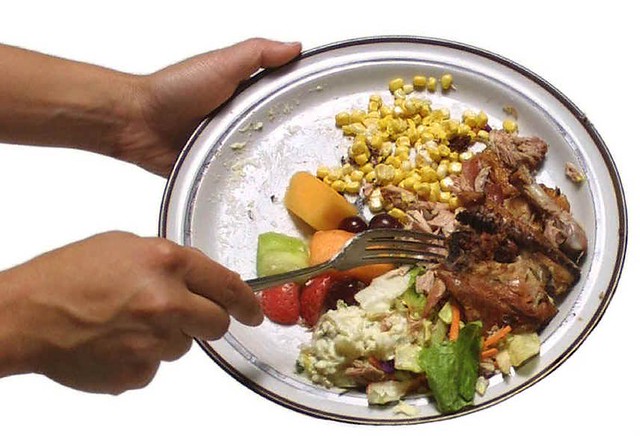When I was a child, the concept of baaltashchis did a number on me. Maybe because I already had a predilection to shun waste, but I became (and still remain) absolutely impossible.
Just this week, I unearthed from the freezer a bag of cherries I froze two years ago when they, courtesy of a fruit of the month club gift, arrived on the doorstep prior to a trip, and made compote out of it. They did defrost to an unappetizing shade of brown, but with the assistance of two raspberry tea bags, a few mushy peaches, a touch of brown sugar, and a squirt of lemon juice, the results are pretty (enough) and palatable.
Throwing away food that was spoiled due to lack of foresight makes my stomach churn. Perhaps as a grandchild of survivors such mindless excess makes me wince, or it's merely my nature; it pains me.

"Starve a Landfill" by Kim Severson sent my sensibilities into hyperdrive.
Homemakers during World War II considered themselves soldiers of the kitchen, with conservation their battle cry. In the 1970s, ecology drove the urge to make good use of kitchen waste.
Somewhere along the line, the art of kitchen efficiency was lost amid grocery stores packed with pre-made pizza shells, bagged lettuce and fruit so perfect it needed no knife work. Dinner was almost as likely to come from the drive-through or the new corner bistro as from the stove.
Prior to the 1970s, kitchen efficiency was a given. In Europe, where food storage was tricky if downright impossible, Babi had to calculate how much dinner would be needed by her brood, down to the crumb, since leftovers could not be frozen or refrigerated. Nor were certain contemporary givens always available; for instance, fruits and vegetables that were only grew in summer were jammed and jarred for winter consumption.
 |
| Via houserevivals.blogspot.com |
Ma, with such an upbringing, does impressive mathematics to prevent waste, even though she has the security of two freezers. Although, some dishes do not respond well to chilly temps, and it would be better to compute their use before they begin to decompose.
Besides for mere sensibility, when Americans throw out food, they are also throwing out money.

I am surprised how many people I know claim to be on limited budgets yet shop without restraint in grocery stores. That's five pairs of shoes, ladies, going into the trash.
Wasting less in the kitchen is just smart economics, said Dana Gunders, a project scientist for the Natural Resources Defense Council whose book, “Waste-Free Kitchen Handbook,” comes out in May.
Eating better may cost more, she said, but an efficient cook can make up the difference. “We are so price sensitive in the store, and 10 cents will swing us one way or other,” she said. “But in the kitchen we throw out so much money without even thinking about price.”
Another culprit: Gimmicky recipes that require exotic ingredients, then the budding cook is stumped how to utilize them again.
“So much home kitchen waste is from people shopping from a recipe,” [Brandi Henderson] said. “Someone will use that weird curry paste once and then won’t have the confidence to think: ‘Hey, this curry paste is really good. I’m going to make some fried rice with it or sauté some shrimp.’ ”
. . . She recommends “The Flavor Bible,” a book by Karen Page and Andrew Dornenburg that features no recipes but encourages intuitive cooking using lists of ingredients and complementary flavors and techniques.
“If we leave the recipe behind and get back to technique cooking,” she said, “kitchen waste will go away.”
"Technique cooking"? Jacques! Oh, Jacques!
If you really belive in baal tashchis, then you should do everything possible to recycle aluminum:
ReplyDeletehttps://groups.yahoo.com/neo/groups/Why_Recycle_Aluminum/info